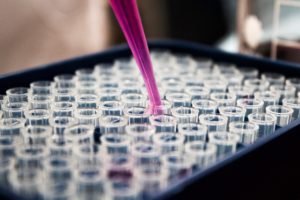
Male fertility is a vital aspect of human reproduction, and it hinges on the intricate dance of hormones within the male reproductive system. Among the numerous factors that can influence male sperm, one of the most critical is the health and balance of hormones responsible for sperm production.
Hormones and How They Affect Sperm
The ability to conceive a child may seem straightforward, but behind the scenes, a symphony of hormones orchestrates the complex process of sperm production. This symphony is led by testosterone, a hormone often associated with masculinity but equally crucial for reproductive health.
Alongside testosterone, follicle-stimulating hormone (FSH) and luteinizing hormone (LH) play pivotal roles in regulating spermatogenesis, the process by which sperm cells develop.
Source: Role of Follicle-Stimulating Hormone in Spermatogenesis
However, like any finely tuned system, the reproductive system can be disrupted by hormonal imbalances, and when it falters, it can impact a man’s fertility. Hormonal imbalances can manifest in various ways, from insufficient testosterone production to imbalances in FSH and LH secretion. These imbalances can lead to a condition known as hypogonadism, characterized by low testosterone levels, or an overabundance of estrogen, typically considered a female hormone but present in males as well.
Understanding the intricate web of hormones that governs sperm production is crucial because when this delicate balance is disrupted, it can result in low sperm count, poor sperm quality, and reduced fertility.
Hormonal imbalances can stem from a variety of sources, including underlying health conditions, chronic diseases like diabetes, obesity, and thyroid disorders, as well as lifestyle factors such as stress, poor diet, and substance abuse.
Understanding Hormonal Regulation of Sperm Production
To comprehend the connection between hormonal imbalances and low sperm count, it’s essential to delve into the remarkable intricacies of how hormones govern the process of sperm production. This section will provide a foundational understanding of how the male reproductive system relies on a delicate hormonal balance for optimal functionality.
Testosterone: male hormone
At the heart of male fertility lies the hormone testosterone, often recognized as the quintessential male hormone. Testosterone is produced primarily in the testes and is responsible for driving various masculine traits, including the growth of facial and body hair, a deep voice, and muscle development. However, its role extends far beyond external features, as it plays a central role in maintaining reproductive health.
Spermatogenesis
Testosterone acts as a catalyst for spermatogenesis, the step-by-step process by which sperm cells are generated. Spermatogenesis occurs within the seminiferous tubules of the testes, where immature sperm cells (spermatogonia) undergo a series of divisions and transformations into mature sperm cells (spermatozoa). This process is finely tuned and tightly regulated by a network of hormones.
Follicle-stimulating hormone and luteinizing hormone
Two other critical hormones in this regulatory network are follicle-stimulating hormone (FSH) and luteinizing hormone (LH). FSH, produced by the pituitary gland, stimulates the testes to produce sperm and supports their maturation. LH, also produced by the pituitary gland, triggers the release of testosterone from the Leydig cells in the testes.
The interplay between these hormones is crucial for maintaining the balance required for optimal sperm production. Testosterone, FSH, and LH must be present in the right quantities and at the right times to ensure the continuous production of healthy sperm.
Source: The Hormones In Male Fertility
Testosterone, in particular, is vital for the development and maintenance of the specialized cells that support and nourish the developing sperm. It also influences the physical properties of sperm, such as their motility and ability to fertilize an egg. Any disruption in the delicate balance of these hormones can result in low sperm count, affecting a man’s fertility.
Hormonal Imbalances and Low Sperm Count
The harmonious orchestration of hormones is essential for maintaining the delicate balance required for optimal sperm production. However, when this balance is disrupted, it can lead to hormonal imbalances, which in turn can result in low sperm count. In this section, we explore the various ways in which hormonal imbalances can undermine the process of spermatogenesis.
Hypogonadism: Low Testosterone Levels
Hypogonadism is a condition characterized by insufficient testosterone production. This hormonal imbalance can occur due to issues with the testes themselves or problems with the pituitary gland or hypothalamus, which regulate testosterone production.
When testosterone levels fall below the normal range, it can hinder the development and maturation of sperm cells, ultimately leading to a reduced sperm count. Hypogonadism can be congenital or acquired and may result from genetic factors, injury, or certain medical conditions.
Elevated Estrogen Levels
While estrogen is typically associated with female reproductive health, it also plays a role in male fertility. In men, a small amount of estrogen is produced by converting testosterone. When estrogen levels become elevated, it can disrupt the hormonal balance necessary for sperm production. This imbalance can occur due to various factors, including obesity, excessive alcohol consumption, or certain medications.
Imbalances in FSH and LH Secretion
Follicle-stimulating hormone (FSH) and luteinizing hormone (LH) play pivotal roles in regulating sperm production. Any disruptions in their secretion can impact spermatogenesis. For instance, if FSH levels are too low, it can hinder the initiation and progression of sperm development. On the other hand, an excess of LH can lead to an overstimulation of the testes, potentially causing a decrease in sperm quality and count.
These hormonal imbalances can result from a range of factors, including genetic predisposition, underlying health conditions, and lifestyle choices. It’s important to note that hormonal imbalances affecting sperm count are not always isolated issues; they can often be intertwined with other health concerns, making a comprehensive assessment crucial for diagnosis and treatment.
Source: Can Hormonal Imbalance Be Genetic?
Health Conditions and Hormonal Imbalances
Hormonal imbalances, as discussed in the previous section, are not always standalone issues; they can often be linked to underlying health conditions that disrupt the finely tuned system of sperm production. In this section, we explore a range of health conditions that can contribute to hormonal imbalances, ultimately leading to low sperm count.
Diabetes and Insulin Resistance
Diabetes, particularly type 2 diabetes, can be associated with hormonal imbalances that affect male reproductive health. Elevated blood sugar levels and insulin resistance, common in diabetes, can interfere with the body’s ability to regulate hormones like testosterone. This disruption can lead to reduced sperm production and quality.
Obesity
Obesity is a complex health condition with far-reaching consequences, and one of these consequences can be hormonal disturbances. Excess body fat can lead to an increase in estrogen production, which can, in turn, disrupt the balance between testosterone and estrogen, negatively impacting sperm production. Moreover, obesity is often associated with insulin resistance, compounding the hormonal challenges.
Thyroid Disorders
Thyroid hormones, including thyroxine (T4) and triiodothyronine (T3), play a crucial role in regulating metabolism and overall health. Both hypothyroidism (underactive thyroid) and hyperthyroidism (overactive thyroid) can affect hormone balance in the body, potentially leading to low sperm count and fertility issues.
Chronic Stress
Prolonged stress can trigger the release of stress hormones, such as cortisol, which can interfere with the production of reproductive hormones like testosterone. Chronic stress can disrupt the hormonal equilibrium needed for healthy sperm production and overall reproductive function.
Medications and Substance Abuse
Some medications and recreational substances can impact hormone levels and contribute to hormonal imbalances. These may include anabolic steroids, opioid painkillers, and certain antidepressants. Substance abuse, such as excessive alcohol consumption or illicit drug use, can also have detrimental effects on hormonal balance and sperm production.
Infections and Inflammation
Infections of the reproductive tract or chronic inflammation in the body can disrupt the hormonal signaling pathways responsible for sperm production. Conditions like epididymitis or prostatitis can lead to localized inflammation that affects sperm quality and count.
Understanding how these health conditions can contribute to hormonal imbalances is crucial for individuals seeking to address low sperm count. While these conditions may have their own distinct effects on the body, they can converge on a common pathway, ultimately impacting reproductive health.
Source: Hormonal Imbalance and Male Infertility
The Impact on Sperm Quality and Fertility
Hormonal imbalances can do more than just lower sperm count; they can also have a profound impact on the quality and motility of sperm. Let’s take a look at how these imbalances affect sperm health and explore the broader implications for male fertility.
- Sperm Quality: Sperm quality encompasses several factors crucial for successful fertilization. These include sperm shape (morphology), motility (ability to swim), and overall vitality. Hormonal imbalances, particularly those affecting testosterone levels, can lead to abnormalities in sperm morphology. Such abnormalities can hinder the sperm’s ability to penetrate the egg.
- Sperm Motility: Proper sperm motility is essential for sperm to reach and fertilize the egg. Hormonal imbalances, especially those associated with elevated estrogen levels or disruptions in FSH and LH secretion, can lead to reduced sperm motility. Sluggish or immobile sperm may struggle to complete their journey, reducing the chances of fertilization.
- Fertility Implications: The culmination of these effects on sperm quality and motility can significantly impact a man’s fertility. Couples struggling to conceive may find that hormonal imbalances play a role in their challenges. Low sperm count, poor sperm quality, and reduced motility all contribute to decreased fertility and an increased likelihood of infertility.
Understanding the link between hormonal imbalances and sperm health is vital for those facing fertility issues. It underscores the importance of addressing underlying health conditions and lifestyle factors that can contribute to these imbalances. Moreover, it emphasizes the significance of seeking medical advice and evaluation when fertility concerns arise.
Source: Role of Hormones in Infertility
It is worth noting that the impact of hormonal imbalances on sperm health can vary from person to person. Some individuals may experience mild disruptions, while others may face more significant challenges. Regardless of the severity, identifying and addressing these imbalances can improve the odds of achieving a healthy pregnancy.
Conclusion: How Hormonal Imbalances Impact Sperm Count
In the intricate world of reproductive health, the connection between hormonal imbalances and low sperm count is a pivotal aspect that cannot be ignored. Understanding the role of hormones in sperm production and the consequences of hormonal imbalances is paramount for those aspiring to maintain or improve their fertility.
Hormonal regulation of sperm production, orchestrated primarily by testosterone, follicle-stimulating hormone (FSH), and luteinizing hormone (LH), is a marvel of nature. These hormones work in harmony to ensure the continuous generation of healthy sperm, which is essential for human reproduction.
However, as we’ve learned, this delicate balance can be disrupted in various ways. Hormonal imbalances, whether caused by underlying health conditions, lifestyle factors, or medications, can throw this symphony off course. When this happens, it can lead to low sperm count, reduced sperm quality, and impaired motility, all of which have profound implications for male fertility.
- The journey through the preceding sections has illuminated how hormonal imbalances can emerge from health conditions like diabetes, obesity, thyroid disorders, and chronic stress. Additionally, we’ve explored the influence of lifestyle factors, such as substance abuse and medication use, on hormonal equilibrium. Recognizing these potential culprits is the first step in addressing the issue of low sperm count.
- Moreover, it is essential to acknowledge that low sperm count is not an insurmountable obstacle. By seeking medical advice, individuals and couples facing fertility challenges can embark on a journey toward understanding and addressing the root causes of their issues. In many cases, identifying and managing underlying health conditions or making positive lifestyle changes can lead to improvements in sperm health and, consequently, fertility.
The connection between hormonal imbalances and low sperm count underscores the complexity of human reproduction and the importance of hormonal harmony in this process. Armed with knowledge and awareness, individuals can take proactive steps to optimize their reproductive health, ultimately increasing their chances of achieving the dream of parenthood. It is a journey that requires patience, perseverance, and the guidance of medical professionals, but it is a journey that offers hope and the potential for new beginnings.


